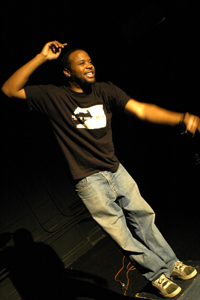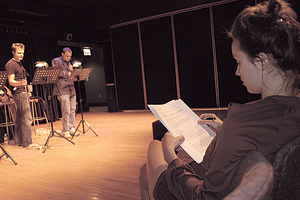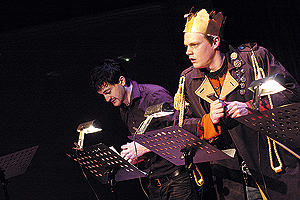New UT residency program Summer Inc. gives local artists space to develop ideas for the stage
By Jennifer CarnigNews Office
  Idris Goodwin (above), rehearses in the first-floor theater space in the Reynolds Club as part of the new Summer Inc. residency begun by University Theater. Goodwin is rehearsing his one-man show I Have an Agenda, a collection of stories, rhymes, music and banter. | |
Clowns, a hip-hop performer and a theater company that unites artists and scientists are among those calling the University their home this summer.
Summer Inc., a new residency created by University Theater, has opened the University’s doors to members of the local theater community. Artists admitted to the program get unlimited, free use of a theater space for a two- to three-week residency, as well as access to a student production manager, and the help and technical support of University Theater staff.
The program is an innovative way for the University to promote the creation of the arts in Chicago by allowing local theater companies an opportunity to develop projects still in their infancy, according to Heidi Coleman, Director of University Theater.
“We wanted to participate in and support new work in Chicago,” Coleman said, explaining that she and her University Theater colleagues realized they could make a real difference in the lives of local writers, directors and actors simply by “showing a little hospitality.
“By inviting people over and taking care of them for a few weeks, we can make a world of difference, and in exchange we are preparing our students to participate in the theater world,” Coleman said. “It’s a wonderful experiment.”
Here’s how it works: Eight groups participate during the course of the summer, with three groups at a time working simultaneously in three different theater spaces—two in the Reynolds Club and one in Bartlett Hall.
The artists have the chance to meet and share ideas with each other, and they use the theaters to read lines, practice movement and otherwise fine-tune their own individual productions. They can work alone the whole time, or open up their rehearsals and take comments and suggestions from students. All the while, members of the companies are encouraged to make themselves at home and use any and all of University Theater’s resources, from the photocopy machine to the computer, whatever it is that they need to get done but never have the time to do.
For writer, musician and actor Idris Goodwin, a self-described “independent hyphenate” who combines hip hop, spoken word and theatrical performance, the residency gives him a chance to slow down and focus on his work. The structure of the residency alone—that he has a theater for two weeks and only two weeks Ð forces him to designate time and work, “to become consumed,” he said. He and director Jonathan Putman find even the process of leaving Wicker Park and heading south to Hyde Park to be an act of introspection and self-reflection.
“Coming here, I have to focus,” he said. “This is a gift of time and concentration.”
Goodwin’s one-man-show I Have an Agenda, a collection of stories, rhymes, music and banter, is coming together, but is not yet the cohesive narrative that he imagines. The hours he puts in practicing in an empty black-box theater on the first floor of the Reynolds Club have been “nothing short of critical. The time and free space are forcing this thing to go from a poetry reading to a theatrical performance.”
University doctoral students Majel Connery and Jonathan Ullyot are using their residency as a way to explore the role that Lamia plays in classical Greek mythology. Lamia, Pygmalion’s sister, was half beast and half woman, a kind of succubus and a model of “how men create the myth of the evil woman,” explained Ullyot, a Ph.D. candidate in Comparative Literature who also works as a professional actor and writer.
 A doctoral student in Music, Majel Connery (seated above in foreground) follows along with the script of Lamia, a production she and her co-producer Jonathan Ullyot (below, wearing crown), a Ph.D. candidate in Comparative Literature at the University, are rehearsing with their cast and crew.  | |
“Men developed these kinds of mythological characters, so we’re looking at what roles they played for the men who created them—what was the point?” continued Connery, a classically trained opera singer and actor who is pursuing a doctorate in Music.
While their feminist portrait of Lamia may eventually be worked into a full operatic libretto, the pair is using the summer residency to create a two-act play, written by Ullyot, with Connery serving as the dramaturg and director.
“Without this opportunity, this production would have never happened,” Connery said. “This residency means that we will hopefully be able to put this on in the fall.”
While some companies are just starting out, some of the participating groups have a well-established following. Big Picture Group is a performance collective that produces serious, text-based dramas, but encases them in a multimedia environment. With its residency, the company is working on a new production called True and False, a series of monologues both real and imagined that explore the increasingly blurry boundary between these once categorical terms.
Set in a multimedia junkyard of discarded televisions and hidden cameras showing both live and pre-recorded images, the performance is meant to test the audience’s ability to untangle the real from the virtual, explained Roger Bechtel, the company’s artistic director and director of graduate studies at Miami University, Ohio.
Though Big Picture is Chicago-based, its members live in New York, Minneapolis and Cincinnati, so the residency is “an amazing luxury,” Bechtel said. The group usually rents rehearsal space, which is not only expensive but also requires time and energy to remove their multimedia equipment and props, which cannot be left overnight.
“This space is an incredible asset for us,” Bechtel said, explaining that his group plans to take advantage of every opportunity during its August residency to use the theater. Days will be spent building the technology—figuring out how to make 15 television monitors work in concert and “creating a big media sculpture.”Evenings will be used to work with actors and design a unified story.
While this collaboration between the University and the community is intended primarily to support Chicago artists, Coleman said she thinks the opportunity for those within the University community to be involved with professional companies will be rewarding. Four students are employed this summer to assist the companies, and several others are involved with the program.
“The benefit to students is amazing,” Coleman said. “The experience of being an integral part of a work that could go on and have a life, to be a part of that creative process and have an impact, it’s just the chance of a lifetime. It’s the same as getting your work published. It’s an experience that shapes you.”
And everyone will have an opportunity to see some of these works in progress. Though Summer Inc. was not designed to have a performance aspect—Coleman wanted the experience to serve as a no-strings-attached program—all of the involved companies have opted to give a performance or reading at the end of their residencies. A complete schedule of events and a list of participating theater companies is available online at: http://ut.uchicago.edu.
![[Chronicle]](/images/sidebar_header_oct06.gif)